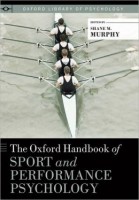 Editor: Shane M. Murphy
Editor: Shane M. Murphy
Publisher: Oxford University Press – 775 pages
Book Review by: Nano Khilnani
Performance psychology, particularly as it pertains to sports, is a relatively new but fast-growing field, and the latest research findings and their practical applications are revealed in this foundational work. This is the first edition of a comprehensive book on this important new science, to be hopefully followed by other editions with updates, as more research is done.
It has long been known and proven that mental qualities such as concentration, confidence, discipline, focus, goal-setting and regular practice, propel athletes to success, especially those involved in individual sports.
Team sports also require the development and frequent use of these qualities, but other characteristics are also needed. The various contributors to this book show us the importance of social psychological processes in above-average and especially, superior performance, such as: coaching, leadership, mentoring, moral behavior, and relationships.
Major competitive team sports such as basketball, baseball and football are well watched by hundreds of millions of viewers in the United States, and the hundreds of billions of dollars at stake in the sports business will make it certain that inquiry into the factors that enhance performance will drive full funding of research programs in performance psychology.
Its 40 chapters written by 70 contributors are organized around 6 main subjects that form Parts One to Six of this volume, entitled:
- The Nature and Scope of Sport and Performance Psychology
- Individual Psychological Processes in Performance
- Social Psychological Processes in Performance
- Human Development and Performance
- Interventions in Sport and Performance Psychology
- Future Directions
The specialists in various aspects of performance psychology reveal in this pioneering work the roles played by such factors as: anxiety, attention, cognition, confidence, efficacy beliefs, emotion, imagery, modeling, motivation, perfectionism, and superior performance intelligence in determining the level of performance.
In both categories of sports – individual and team – understanding the factors relating to human development is important, to get better results. The editors and authors show the unquestionable importance of nurturing expertise and talent, positive youth development, the role of the family, the end of involvement transitions, and youth and masters-level sport and physical activity programs
Problems frequently get in the way of performance development, so the book also contains discussions on how to overcome them. The ‘interventions in sport and performance psychology’ are key steps to take to get athletes back on track. ‘Counseling of performers in distress’ is critical to continued positive development of athletes, the article writers point out.
Appearance- and performance-enhancing drug use, burnout, controlling weight, eating, managing pain, and regular physical exercise are some of the other issues taken up in this comprehensive book.
In the last chapter the editor Shane Murphy asks three leading sports performance psychologists a series of questions on what they envisioned as the main challenges facing sports performance psychology.
The answers turned out to be, as he describes with these adjectives: “absorbing, honest, insightful and provocative.” I urge readers to get a copy of this valuable book to get first-hand view of their thoughts. These people deal directly with professional athletes and top sports performers
This book is a pioneering work in a new field, and its editor and 70 contributors have provided us with information and original research not available anywhere.
Shane. Murphy, PhD., is a licensed psychologist and Professor of Psychology at Western Connecticut State University in Danbury, Connecticut where he teaches sport, health and performance psychology. Dr. Murphy served as head of the United States Olympic Committee’s Sport Psychology Department from 1987 to 1994, and from 1992 to 1994 he was Associate Director of its Division of Sport Science and Technology.
In addition to working with the world’s top athletes, Shane is a performance consultant to many companies and organizations and has worked with Bristol-Myers Squibb, Deutsche Bank, Pepsi, Royal Bank of Scotland, Siemens-Rolm, and a number of performing artists, directors, musicians, and arts groups.







